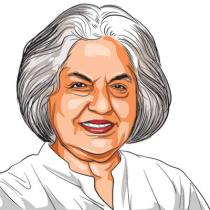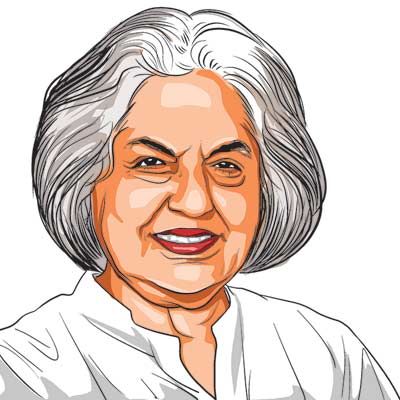Removing biases
Supreme Court verdict in Jarnail Singh case restores the principle that reservations are intended to achieve equality in representation.

At the heart of the problem is the inability of the Supreme Court to understand the very meaning of “equality” and the purpose of reservations. (File)
The issue for debate before a bench of five judges of the Supreme Court in Jarnail Singh v. Lachhmi Narrain Gupta was whether M. Nagaraj v. Union of India (Nagaraj) required reconsideration. Nagaraj had held that before the Scheduled Caste and Scheduled Tribe candidates can be promoted, the states had to prove by “quantifiable data” that they were indeed “backward”. There was no definition of the expression “backward” and whether it is social backwardness, educational backwardness, economic backwardness or untouchability of which “quantifiable data” was to be collected. As a result, all promotions made post-Nagraj were struck down on the ground that there was no quantifiable data.
The expression, “Scheduled Castes” simply refers to castes added to a Schedule in the Constitution. The expression “backward class” in Article 16(4) of the Constitution refers to these “untouchable castes” known under British rule as “depressed classes”, and those we have come to be known as “other backward classes”. Article 16 (4-A) of the Constitution allows reservation in promotion for the untouchable castes and tribes only and not for “other backward classes”. Given that the marker of identity of Scheduled Castes is the historic disadvantage of the untouchable, the question of proving backwardness by quantifiable data does not arise. This was the basic flaw of the Nagaraj judgment; its failure to recognise these markers of identity. This now stands corrected.
Following the Poona Pact, B R Ambedkar gave up the demand of the Dalit community for separate electoral colleges. Instead, it was agreed that the castes described by the British as “depressed classes” would be given reservation in employment with joint electorates (in the provincial and central legislatures) for a larger number of seats than envisaged by the Mac Donald award. There was thus, a national compact that the “depressed classes” should be represented in appointments in public services as well as in local bodies, in other words reservation in public services and local bodies. The said ‘depressed classes’ came to be known as “Scheduled Castes” and “Scheduled Tribes”.
At the heart of the problem is the inability of the Supreme Court to understand the very meaning of “equality” and the purpose of reservations. Does it mean, as argued by the Late Nani Palkhivala in the Indra Sawhney case, that “merit” alone will determine opportunities in employment, or does it mean an equitable distribution of job opportunities among different sections of the society, such that we all have a stake in democratic governance, whether we determine our identities by gender or by caste or by our historic disadvantage?. I tend to think it’s the latter. Merit is a social construct, another name for being born into advantage.
It follows from this that a balance will be struck between the allotment of posts in the public sector between the claims of the upper castes and those of the untouchable castes and tribes. This balance can be achieved by reserving the appropriate number of posts for the Scheduled Castes and Scheduled Tribes and the rest of the candidates. How should that balance be struck? Since independence, the quantum of reservations has been based on the demographic distribution of these communities. Today, approximately 15 per cent of posts are reserved for the Scheduled Castes and 7 per cent for the Scheduled Tribes . The Court now tells us that this is not the appropriate method of determining the quantum but fails to indicate why not or what are the alternatives .
Then comes the question of exclusion of the so-called “creamy layer,” an expression not found in the Constitution. Given that identification of beneficiaries is not based on economic criteria, but on caste markers, how can there be such an exclusion? If indeed economic cut off are to be put ostensibly to advance the cause of the surely backward, then why should reservation not be given to the people of below poverty line (BPL) of all castes, including the upper castes? This form of reservations has been rejected by the Supreme Court and yet the Court suggests as a matter of policy it should exist for the Scheduled Castes and Tribes.
Reservations are intended to achieve equality in the matter of representation in public employment and, consequentially, in state power. Let me illustrate this with an analogy. Today, we argue that women should be adequately represented in all structures of the state as well as in the private sector, including higher positions such as the CEOs and the board of directors. No one has yet opposed this demand nor has anyone argued that the “creamy layer” of women should be excluded from being members of the board of directors.
The Court has been myopic in suggesting that the more backward among the backward must only get promotion in a country in which people die while manual scavenging and all the public sector positions of sweepers are occupied by Scheduled Castes. The only Scheduled Caste Chief Justice of India this country has ever seen had gone on record to say that he too was not accepted in a respectable company among his brethren. The judgment in Jarnail Singh must be welcomed as paving the way for promotions for Scheduled Castes and Scheduled Tribes in public employment thereby furthering and deepening the Constitution’s equality.
An obsessive concern of the Supreme Court while denying reservation in different forms has been “efficiency in administration”. In response, I pointed out to the Court that no person can be promoted unless they obtain a “Good” rating in their ACR. What more can they do to show that efficiency is not compromised?
The Government of India has no system of doing a proforma appraisal of its departments as a whole. If a department is underperforming, how does one say that it is on account of the Scheduled Caste and Scheduled Tribe community? It would seem bias provides the answer, not evidence.
The writer is former additional solicitor general and senior advocate, Supreme Court.
For all the latest Opinion News, download Indian Express App
More From Indira Jaising
- Crime and consentIn reconsidering the constitutionality of Section 377, Supreme Court must affirm that criminal law has no place between consenting adults...
- Right to Privacy: A Brake On GovernmentRight to privacy judgment finally consigns the Emergency to the past..
- Victim in the dockSupreme Court order saying the law on cruelty against women is misused is based on erroneous conclusions drawn from NCRB figures that don’t reveal the…












.png)



























No hay comentarios:
Publicar un comentario